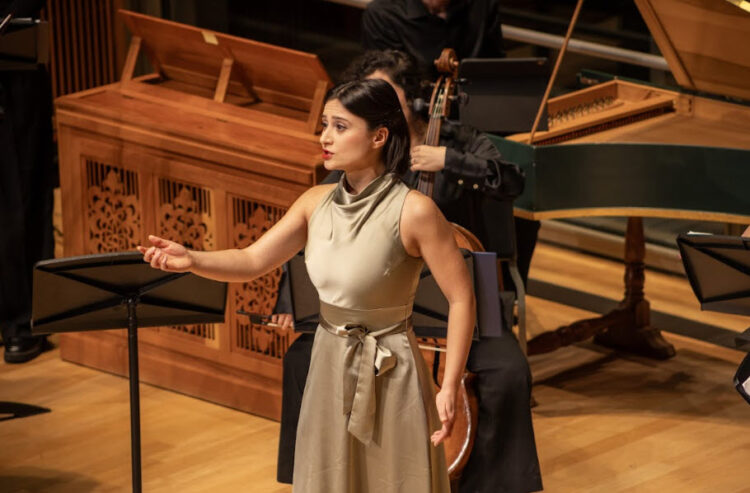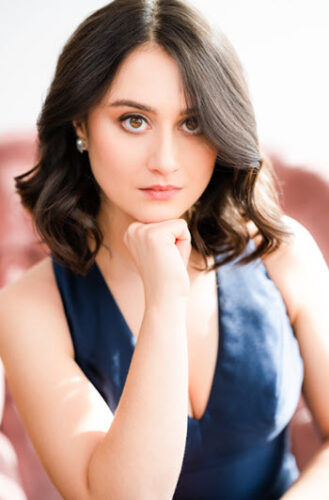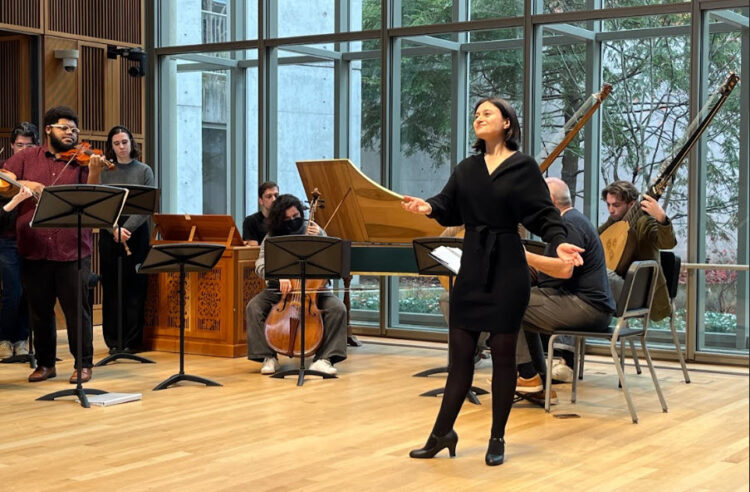This Early to Rise profile was first published in the January, 2025 issue of EMAg, the Magazine of Early Music America.
Watch and listen to Duo CPE perform at the Emerging Artists Showcase on YouTube (below) and catch them in concert at the Boston Early Music Festival.

On stage, it’s a busy time for Andréa Walker. In addition to dates with the Atlanta Baroque Orchestra (as Belinda in Dido & Aeneas) and as an Apollo’s Fire Mosaic Young Artist Fellow — an initiative to share early music with diverse audiences — the Texas-born, Mexican-American soprano is making debuts with Seraphic Fire, NYS Baroque, and Pegasus Early Music. She also sang in inaugural concerts by two start-up ensembles: her own, Duo CPE, with fortepianist Mikhail Grazhdanov, in a program of Lieder honoring C.P.E. Bach; and an all-star series dubbed Concierto CLE — after Cleveland’s airport code — with virtuosic performances and a strong educational element.
All the while, Walker has been a doctoral student at Case Western Reserve University — although she admits that, at Case, “the program is so intense, it’s hard to get time to do everything I want. I have to push myself to do solo work.”

Still, the offers (and repeat engagements) keep coming her way. Beyond her silvery, gorgeous voice, “she’s the epitome of preparation and perfectionism,” says Concierto CLE founder Qin Ying Tan, on the harpsichord faculty at Baldwin-Wallace University. “I admire her ability to connect music with words in a way that sheds light on the art and makes it resonate with audiences.” It helps, too, that she “shares a deep connection in our views on music and society.”
Walker recalls she was instantly, instinctively, hooked on historical performance after catching the New York Baroque Dance Co. and Ars Lyrica Houston in French Baroque music. That was in 2015. “The program encapsulated the interdisciplinary nature required of HP,” she offers. “In HP, it’s not enough to be a musician. For a singer, being steeped in historical physical gesture, oration, declamation, dance, and theory enlivens the repertoire immensely. I got to see it all play out in this one concert. Even if I didn’t understand why at the time, it left a mark on my soul.”
But growing up in San Antonio, the sounds she heard were not especially Baroque. Although she sang in choirs and often attended local orchestra concerts, mariachi was the soundtrack for gatherings and celebrations on the Mexican side of her very musical family.
After a master’s degree from the Yale Institute of Sacred Music, winning awards along the way, she enrolled at Case with the ambition to tackle two big, mostly uncharted projects: historical Lieder performance and Latin American music, specifically from the vice-royalty of New Spain.
Although she’s started “digging into that rich, rich repertoire and history,” typically housed in places such as the cathedral in Mexico City, she has yet to perform much of the music. “Unfortunately, colonial-era music in Mexico hasn’t been revived to its full potential. It’s been challenging, archivally speaking, to dig up repertoire and get it to a performance stage.”
Walker’s initial DMA topic was partly inspired by her own training as a pianist. At a lecture-recital on late 18th-century German salon culture, she accompanied herself at the piano, “a supremely liberating act.” Even someone without intensive keyboard experience can often accompany themselves in thin-textured, strophic songs, she says, and “to be an amateur in the true sense of the word, with love and curiosity, is what historical performance is about. It’s really fun.”
With fortepianist Grazhdanov, her Duo CPE performed in the Emerging Artist Showcase at the 2024 EMA Summit in October, where Walker was particularly excited by “Monolog des Tasso” by Johann Friedrich Reichardt, “a free-form, dramatic monologue, which is like the vocal equivalent of the empfindsamer Stil keyboard fantasia.”
More recently, to keep on track with her doctorate, she switched her focus to Charpentier, sacred drama, and physical gesture: “If I’m being honest, it’s because it’s less uncharted territory.”
As her career unfolds, Walker continues, “I’m certainly learning a lot along the way — like how to sculpt a diverse freelance season with a balance of projects that feels true to my artistic values. I’m also working on ways to cope with the physical and emotional demands of the job!”
Walker hopes an ensemble like Duo CPE will help expand historical performance practice beyond the Baroque. “I don’t know if it’s an official movement yet,” she says with a chuckle, “but the hashtag #BeyondBaroque needs to become a thing — people say it already, but it needs to become a movement.”
The agency to make decisions about what, where, and how to perform is a special aspect of historical performance, she says. And while we seem to be in a perpetually difficult climate for the arts, she looks forward to expanding her career, both as a performer and a scholar, and finding the community to help realize her most ambitious projects.
Her number one piece of advice for younger performers? “Network like crazy so you can find friends that shares your values.”

Genevieve McGahey, a soprano, concert producer, and scholar, is the executive director of Capital City Symphony in Washington, D.C. For EMAg, she is the author of “Art of the Day Job” (Sept. 2023).

